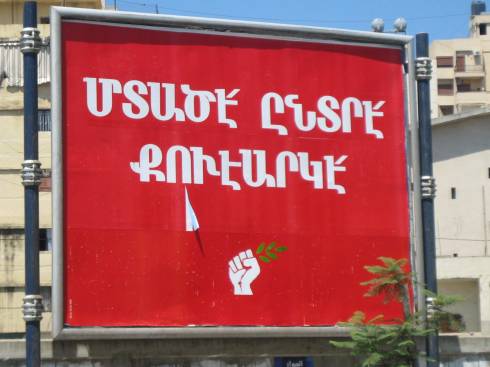Poll finds wide support for female quota
By Dalila Mahdawi
Daily Star staff
Saturday, February 20, 2010
BEIRUT: Women in Lebanon may not seek out political leadership positions as often as men but they are potentially more likely to vote in elections, a new study has found.
Results from “The Status of Women in the Middle East and North Africa Project” were released on Wednesday and Thursday to non-governmental organizations and academics, who also received training on how to use the data effectively to advocate policy change.
The International Foundation for Electoral Systems (IFES) and the Institute for Women’s Policy Research (IWPR) carried out the study with funding from the Canadian International Development Agency as part of survey data collection in Lebanon, Morocco and Yemen.
“The general goal was to collect data on the status of women, especially in areas where there are gaps,” such as social attitudes toward policy change and women’s perceptions of themselves, said Rola Abdel-Latif, a research officer at IFES and the survey’s specialist.
Lebanon’s parliamentary elections in June 2009 were widely acclaimed as the most competitive in years. Out of a total of 587 candidates, however, only 12 were women, a figure that translates into about 2 percent. Out of those 12, only four were elected to Lebanon’s 128-member Parliament. In contrast to poor political representation, the IFES/IWPR survey found women had a “slightly higher voter turnout” than men in the elections, with 80 percent saying they voted, versus 78 percent of men.
The results confirm those of a January study by the Lebanese Council of Women, which found slightly more women had gone to the ballot box than men.
“While civic engagement … is relatively limited, voting in the elections, which is a more direct form of political participation, was high for both men and women,” the survey said. It added that there was no difference in women’s participation in the elections “when looking at urban versus rural areas or when looking at voter turnout by sect.”
IFES/IWPR said improving the status of women was at the bottom of the agenda for both men and women voters, with only 13 percent of women and 8 percent of men mentioning it as one of the issues to be prioritized. Men and women both prioritized the same three factors that influence their votes: candidates who are not corrupt, services that candidates provide to their area, and candidate’s platform.
The survey also found widespread support for the adoption of a women’s political quota, Abdel-Latif said, with more than two-thirds of respondents supportive. Nevertheless, “this is in contrast to what we seen in Lebanon, where very few people actually go and vote for women,” it said.
Researchers also noted some “surprising” results, such as the fact more women (64 percent) than men (54 percent) are opposed to creating an optional civil marriage law, which would give couples the freedom to marry outside of religious establishments. “Unfortunately women are more opposed to this, even though the personal status laws in Lebanon are more against women than men,” Abdel-Latif said.
She pointed to the important role to be played by civil society organizations in raising awareness about the benefits of a civil marriage option. Currently, Lebanese can only be married by a religious authority, although Beirut does register civil marriages performed abroad.
The survey found an overwhelming majority of Lebanese, both men and women, supported reform of Lebanon’s discriminatory nationality law. Lebanon’s current citizenship law allows men to pass on their nationality to non-Lebanese wives and children one year after their marriage is registered, but prohibits Lebanese women married to non-Lebanese from doing the same.
The results of 82 percent of women and 73 percent of men supporting a change to the law were “pretty encouraging,” Abdel-Latif said.
Although the survey found that there was equal access to education between the genders, it also found a considerable gender gap in income. “Men who work for pay make much more money than women who work for pay,” Abdel-Latif said.
Almost six in 10 women in Lebanon make less than $500 a month, compared to 30 percent of working men.
Some 20 percent of men make more than $1,100, compared to only 7 percent of women. “There are still a lot of Lebanese women employed in traditionally feminized fields,” such as cosmetology or teaching, Abdel-Latif said.
 BEIRUT: Constituents in Beirut I, a predominantly Christian district, crowded into polling stations on Sunday to elect five candidates to join the country’s next parliament. As
BEIRUT: Constituents in Beirut I, a predominantly Christian district, crowded into polling stations on Sunday to elect five candidates to join the country’s next parliament. As  Supporters of the Armenian Tashnag party, which is allied with March 8, took to the polls in particular force in the early morning hours, with convoys of cars bearing the party emblem and Armenian flag dropping off entire families outside polling stations. According to exit polls, 31,500 people in Beirut I voted, among them 6,700 Armenians.
Supporters of the Armenian Tashnag party, which is allied with March 8, took to the polls in particular force in the early morning hours, with convoys of cars bearing the party emblem and Armenian flag dropping off entire families outside polling stations. According to exit polls, 31,500 people in Beirut I voted, among them 6,700 Armenians.











Recent Comments